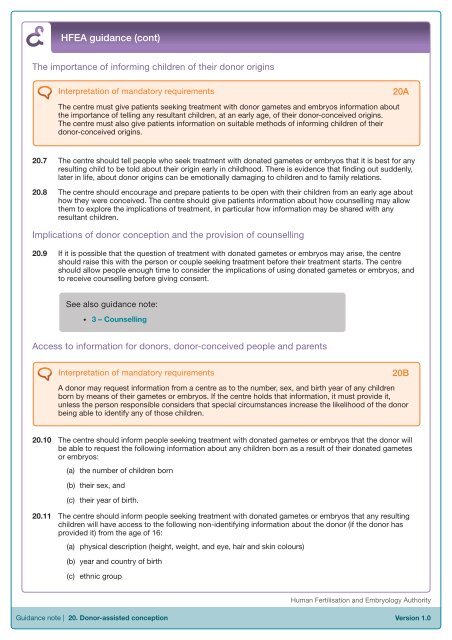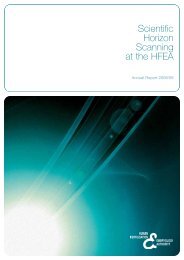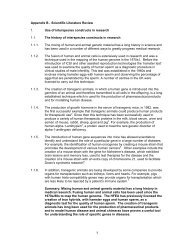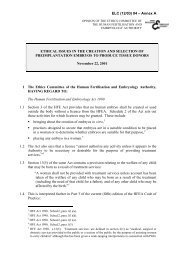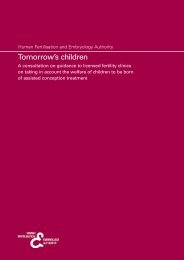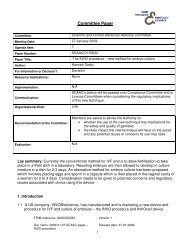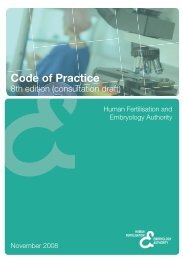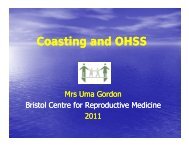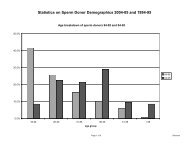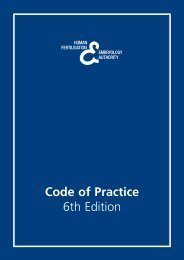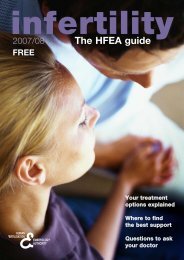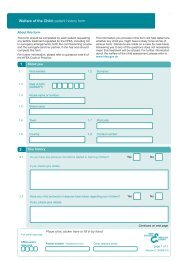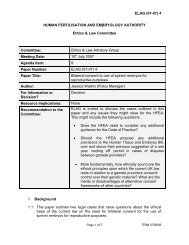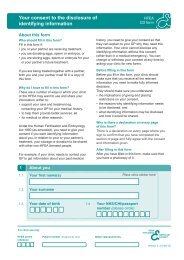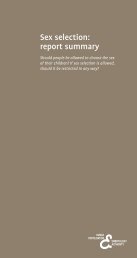Eighth Edition - R.3 - Human Fertilisation & Embryology Authority
Eighth Edition - R.3 - Human Fertilisation & Embryology Authority
Eighth Edition - R.3 - Human Fertilisation & Embryology Authority
You also want an ePaper? Increase the reach of your titles
YUMPU automatically turns print PDFs into web optimized ePapers that Google loves.
HFEA guidance (cont)<br />
The importance of informing children of their donor origins<br />
Interpretation of mandatory requirements<br />
The centre must give patients seeking treatment with donor gametes and embryos information about<br />
the importance of telling any resultant children, at an early age, of their donor-conceived origins.<br />
The centre must also give patients information on suitable methods of informing children of their<br />
donor-conceived origins.<br />
20A<br />
20.7 The centre should tell people who seek treatment with donated gametes or embryos that it is best for any<br />
resulting child to be told about their origin early in childhood. There is evidence that finding out suddenly,<br />
later in life, about donor origins can be emotionally damaging to children and to family relations.<br />
20.8 The centre should encourage and prepare patients to be open with their children from an early age about<br />
how they were conceived. The centre should give patients information about how counselling may allow<br />
them to explore the implications of treatment, in particular how information may be shared with any<br />
resultant children.<br />
Implications of donor conception and the provision of counselling<br />
20.9 If it is possible that the question of treatment with donated gametes or embryos may arise, the centre<br />
should raise this with the person or couple seeking treatment before their treatment starts. The centre<br />
should allow people enough time to consider the implications of using donated gametes or embryos, and<br />
to receive counselling before giving consent.<br />
See also guidance note:<br />
<br />
3 – Counselling<br />
Access to information for donors, donor-conceived people and parents<br />
Interpretation of mandatory requirements<br />
A donor may request information from a centre as to the number, sex, and birth year of any children<br />
born by means of their gametes or embryos. If the centre holds that information, it must provide it,<br />
unless the person responsible considers that special circumstances increase the likelihood of the donor<br />
being able to identify any of those children.<br />
20B<br />
20.10 The centre should inform people seeking treatment with donated gametes or embryos that the donor will<br />
be able to request the following information about any children born as a result of their donated gametes<br />
or embryos:<br />
(a)<br />
the number of children born<br />
(b)<br />
(c)<br />
their sex, and<br />
their year of birth.<br />
20.11 The centre should inform people seeking treatment with donated gametes or embryos that any resulting<br />
children will have access to the following non-identifying information about the donor (if the donor has<br />
provided it) from the age of 16:<br />
(a)<br />
physical description (height, weight, and eye, hair and skin colours)<br />
(b)<br />
(c)<br />
year and country of birth<br />
ethnic group<br />
<strong>Human</strong> <strong>Fertilisation</strong> and <strong>Embryology</strong> <strong>Authority</strong><br />
Guidance note | 20. Donor-assisted conception<br />
Version 1.0


